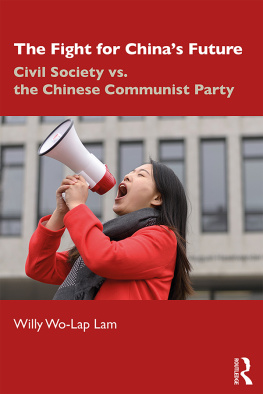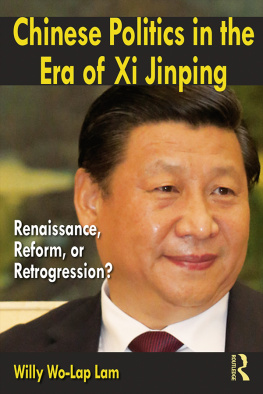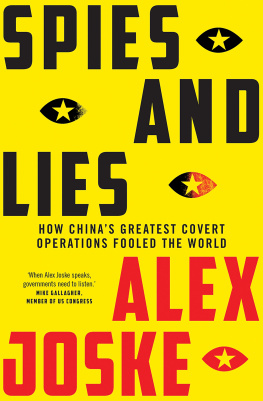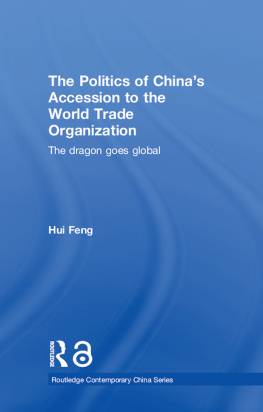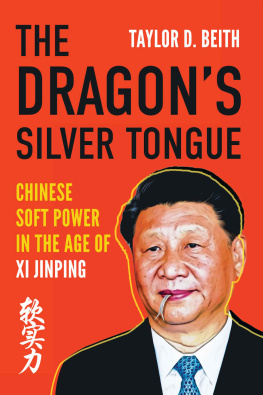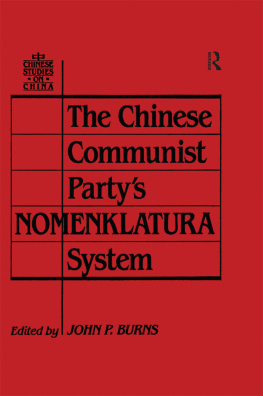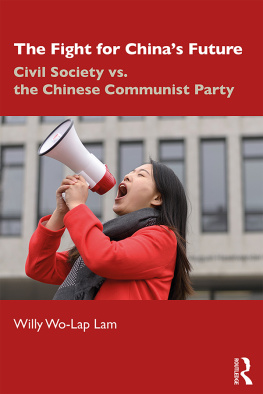THE FIGHT FOR CHINAS FUTURE
The Fight for Chinas Future throws light on the quintessence of 21st century Chinese politics through the prism of the struggle between the Chinese Communist Party (CCP) and Chinas vibrant intelligentsia and civil society.
This book examines Xi Jinpings 24-hour, multidimensional, AI-enabled police-state apparatus and explores the CCPs policy towards civil society. Through exclusive interviews with activists from different provinces, it analyzes the experiences and aspirations of key stakeholders in Chinese society, especially intellectuals, human rights attorneys and Christian worshippers. Providing an examination of recent global trends in relation to CCP policies, including Chinas relationship with the U.S., it also goes on to explore the possible trajectories of future change.
Featuring an assessment of Xi Jinpings leadership style and the opportunities this has given certain groups to promote the rule of law, media freedom and other global norms, this book will be invaluable to students of Chinese politics, society and culture.
Willy Wo-Lap Lam is Adjunct Professor at the Center for China Studies and the Department of History, Chinese University of Hong Kong, Hong Kong. He is the author of Chinese Politics in the Era of Xi Jinping (Routledge, 2015) and the editor of Routledge Handbook of the Chinese Communist Party (2018).
First published 2020
by Routledge
2 Park Square, Milton Park, Abingdon, Oxon OX14 4RN
and by Routledge
52 Vanderbilt Avenue, New York, NY 10017
Routledge is an imprint of the Taylor & Francis Group, an informa business
2020 Willy Wo-Lap Lam
The right of Willy Wo-Lap Lam to be identified as author of this work has been asserted by him in accordance with sections 77 and 78 of the Copyright, Designs and Patents Act 1988.
All rights reserved. No part of this book may be reprinted or reproduced or utilised in any form or by any electronic, mechanical, or other means, now known or hereafter invented, including photocopying and recording, or in any information storage or retrieval system, without permission in writing from the publishers.
Trademark notice: Product or corporate names may be trademarks or registered trademarks, and are used only for identification and explanation without intent to infringe.
British Library Cataloguing-in-Publication Data
A catalogue record for this book is available from the British Library
Library of Congress Cataloging-in-Publication Data
A catalog record has been requested for this book
ISBN: 978-0-367-18866-5 (hbk)
ISBN: 978-0-367-18869-6 (pbk)
ISBN: 978-0-429-19891-5 (ebk)
History has its coincidences. No sooner had Xi Jinping amended the Chinese Constitution in March 2018 to enable him to rule for life than Donald Trump unleashed upon the Peoples Republic of China multiple salvoes in areas including trade, technology and geopolitical contention. The years 2018 and 2019 would be remembered as the beginning of a ferocious new Cold War between the status quo superpower that largely supports global norms, and a quasi-superpower that thrives on hard authoritarianism, a party-controlled economy, and an unprecedentedly tight control over the civil society and such of its components as dissidents, intellectuals, rights attorneys, house church followers and labor activists.
History, however, also has ironclad rules that punish those who have refused to draw the proper lessons from past fiascos. Chinas topsy-turvy history has been dramatized the past two years by a series of anniversaries. The year 2018 marked the 120th anniversary of the short-lived 100 Days Reform of the Qing Dynasty and the 40th anniversary of Deng Xiaopings Era of Reform and the Open Door. The year 2019 marked the centenary of the May Fourth Movement, the 125th anniversary of the beginning of the First Sino-Japanese War, and, of course, the 70th birthday of the Peoples Republic of China. While trying to fend off constant surveillance and harassment by Xis AI-enabled police state apparatus, intellectuals and NGO pioneers are wrestling with some overwhelming questions. For example, although CCP leaders ranging from Jiang Zemin to Xi Jinping have insisted that Western values such as rule of law and civil rights are not suitable for Chinas guoqing (national conditions), Marxism not only hails from the West but is widely regarded as a failed creed by European and American intellectuals. (In May 2018, Xi lavishly celebrated Marxs 200th birthday and even sent a five-meter statue of the thinker to his birthplace Trier. But most Germans were lukewarm toward the controversial founder of Marxism and Communism.) Many of the mistakes made by the CCP during the Mao era were partly due to the Great Helmsmans self-serving misinterpretations of the teachings of Marx and Lenin; yet Mao disciple Xi seems destined to perpetuate blunders such as erecting a personality cult around himself, upholding the partys monopoly on power, tightening the dictatorship of the proletariat and squashing the breathing space of intellectuals and other activists in the countrys fast-growing civil society. Despite the pranks that history seems to have played on China, civil society pacesetters are adamant that the Cultural Revolution (19661976) and related mistakes must never be allowed to recur.
While pondering such weighty issues, I have benefited from much-needed encouragement, expert advice and timely tips, tea and sympathy from the following friends and colleagues: Robert Barnett, Jean-Philippe Bja, Bo Zhiyue, Keith Bradsher, Anne-Marie Brady, Kerry Brown, Jean-Pierre Cabestan, Anson Chan, Jane Chan, Chan Kin-man, Priscilla Chan, Gordon Chang, Nicholas V. Chen, Helen Cheng, Joseph Y.S. Cheng, Pearl Chih, Ching Cheong, Linda Choy, David Faure, Edward Friedman, Chlo Froissart, Brad Glosserman, Ryoichi Hamamoto, Harry Harding, Chiew-Siang Bryan Ho, Russell Hsiao, Bertel Heurlin, Hung Ching-tin, Peter Jennings, Jan Kiely, Amy King, Timmy Kwai, Patricia Kolb, Carol Lai, Jimmy Lai, Lai Ming Chiu, Diana Lary, Emily Lau, Franky F.L. Leung, Theresa Leung, Angela Li, Linda Li, Joe Lian Yi-Zheng, Lee Yee, Albert Lim, Delia Lin, Perry Link, Dimon Liu, Sonny Lo, Paul Loong, Bruce Lui, Michelle Ng, Mak Yin-ting, Norihito Mizuno, Jeanne Moore, Ng Ka Po, Joyce Nip, Minxin Pei, Eva Pils, David Shambaugh, Simon Shen, Victor Shih, Claude Smadja, Masaru Soma, Volker Stanzel, Robert Suettinger, Norihiko Suzuki, Carina Szeto, Akio Takahara, Marina Thorborg, Luigi Tomba, Kristof van den Troost, Steve Tsang, King Tsao, Jonathan Unger, Sebastian Veg, Arthur Waldron, Kan-Tai Wong, Pak Nung Wong, Alfred Wu, Guoguang Wu, Wu Lik-hon, Ray Yep, Chris Yeung, Yukiko Yokono, Fong-ying Yu, Maochun Yu, Ricky Yue and Zhang Baohui.
I would like to express my gratitude to the Smith Richardson Foundation, whose generous support has been crucial to the success of this project. Thanks are particularly due to the Foundations Senior Program Officer Allan Song for his advice and counsel. The Jamestown Foundation, of which Ive been a nonresident Senior Fellow since the early 2000s, has been an unfailing source of encouragement and support. I salute, in particular, President Glen Howard for many years of unfailing help.
Special thanks are due to the editorial, production and marketing staff of Routledge for taking very good care of this manuscript. I am particularly indebted to the generous help of Publisher, East Asia Stephanie Rogers and Senior Editorial Assistant Georgina Bishop. I would like to record my gratitude to the Notre Dame University Press for permission to reuse tidbits of my chapter on the Chinese intellectual in

